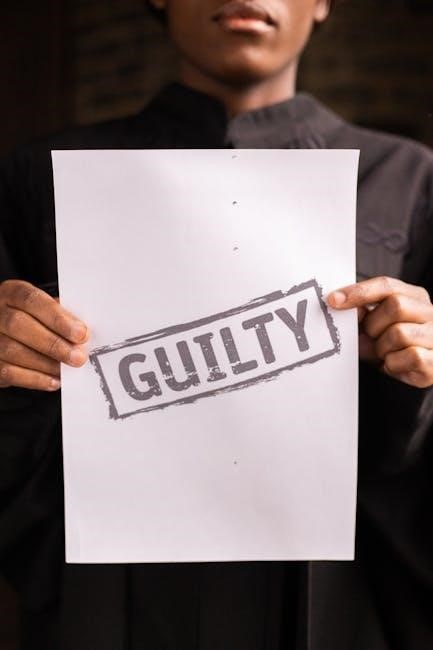
colorado criminal jury instructions
Colorado criminal jury instructions guide jurors on applicable laws and legal standards‚ ensuring a fair trial. They clarify complex legal concepts‚ aiding jurors in reaching informed verdicts.
1.1 Purpose and Importance of Jury Instructions
Jury instructions in Colorado criminal trials serve as clear guidelines for jurors‚ ensuring they understand the law and their role. They provide legal definitions‚ clarify standards like “reasonable doubt‚” and outline the burden of proof. These instructions are crucial for a fair trial‚ as they help jurors apply the law correctly to the evidence presented‚ ensuring justice and consistency in the judicial process.
1.2 Overview of Colorado’s Legal Framework
Colorado’s legal framework for criminal jury instructions is rooted in state statutes and case law‚ ensuring consistency and fairness. The Colorado Criminal Code outlines specific offenses‚ penalties‚ and legal standards‚ while the judiciary provides structured guidelines. These instructions are developed to align with legal precedents‚ offering clear directives for jurors to apply the law accurately during trials.
Structure and Components of Colorado Jury Instructions
Colorado jury instructions are structured to clearly outline legal definitions‚ burdens of proof‚ and specific charges‚ ensuring jurors understand their role and the law.
2.1 General Format and Layout
Colorado criminal jury instructions follow a standardized format‚ ensuring clarity and accessibility. They are organized with clear headings‚ bullet points‚ and concise language to guide jurors. The layout emphasizes legal definitions‚ key evidence‚ and specific charges‚ making complex concepts understandable. This structured approach aids jurors‚ judges‚ and attorneys in navigating the trial process effectively.
2.2 Key Sections and Elements
Colorado criminal jury instructions typically include clear legal definitions‚ evidence evaluation guidelines‚ and specific charges. They outline the burden of proof‚ reasonable doubt standards‚ and jury conduct rules. Instructions often feature bullet points for clarity and may include examples to illustrate key concepts. Standardized templates ensure consistency‚ while case-specific instructions address unique circumstances‚ ensuring jurors understand their role and legal principles accurately.

The Jury Selection Process in Colorado
The jury selection process in Colorado assesses eligibility based on citizenship‚ residency‚ legal capacity. Attorneys conduct voir dire to evaluate jurors’ impartiality for the case.
3.1 Criteria for Jury Eligibility
In Colorado‚ jury eligibility requires individuals to be at least 18 years old‚ U.S. citizens‚ and residents of the county. They must possess legal capacity‚ free from mental incapacity‚ and not have felony convictions or be under legal disabilities. These criteria ensure jurors are impartial‚ capable‚ and representative‚ maintaining the integrity of the judicial process and ensuring a fair trial.
3.2 Attorney’s Role in Voir Dire
Attorneys play a crucial role in voir dire by questioning potential jurors to assess impartiality and suitability. They use techniques like the Colorado Methods scale to evaluate jurors’ biases. Attorneys aim to identify and challenge jurors who may be predisposed against their client. This process ensures a fair and impartial jury‚ adhering to Colorado’s legal standards for criminal trials and safeguarding the defendant’s right to a just trial.

Legal Standards and Definitions
Colorado criminal jury instructions outline the legal standards and definitions essential for jurors to understand. These include the burden of proof‚ reasonable doubt‚ and specific crime elements‚ ensuring clarity and consistency in criminal trials.
4.1 Burden of Proof and Reasonable Doubt
Colorado criminal jury instructions emphasize that the prosecution must prove guilt “beyond a reasonable doubt‚” the highest standard in criminal law. This principle ensures the accused is only convicted when evidence overwhelmingly supports guilt. Jurors are instructed to acquit if doubt remains‚ balancing justice and protection of the innocent. This standard is central to fair trials and upholding due process rights.
4.2 Specific Legal Definitions Relevant to Criminal Cases
Colorado criminal jury instructions provide clear definitions of key legal terms‚ such as “intent‚” “mens rea‚” and “actus reus‚” ensuring jurors understand the elements of crimes. These definitions are crucial for applying the law accurately. For example‚ theft is defined as unlawfully taking property with intent to deprive the owner permanently. Jurors rely on these precise explanations to evaluate evidence and determine guilt or innocence based on legal standards.
Instructions for Specific Crimes
Colorado criminal jury instructions provide tailored guidance for specific offenses‚ such as homicide‚ assault‚ theft‚ and property crimes‚ ensuring clarity on unique legal elements and standards.
5.1 Homicide and Assault Charges
Colorado criminal jury instructions for homicide and assault charges clarify the legal elements required for conviction‚ such as intent‚ premeditation‚ or extreme indifference to human life. They distinguish between degrees of homicide‚ such as first-degree murder versus manslaughter. Instructions also define assault‚ including misdemeanor and felony classifications‚ ensuring jurors understand the specific conduct and mental states necessary to prove these crimes beyond a reasonable doubt.
5.2 Theft and Property Crimes
Colorado criminal jury instructions for theft and property crimes define the legal elements required for conviction‚ such as unlawful taking‚ intent to deprive‚ and the value of the property. They differentiate between misdemeanor and felony theft based on the property’s value. Instructions also clarify specific offenses like criminal mischief and burglary‚ ensuring jurors understand the necessary intent and knowledge required for a conviction under Colorado law.
The Role of the Jury in Criminal Trials
The jury acts as impartial fact-finders‚ applying the law as instructed by the court to the evidence presented‚ determining guilt or innocence based on legal standards.
6.1 Jury Deliberations and Decision-Making
Jury deliberations are a critical phase where jurors discuss evidence‚ weigh testimonies‚ and apply legal instructions to reach a verdict. In Colorado criminal cases‚ jurors must unanimously agree on guilt or innocence‚ ensuring fairness and accountability. Proper instructions guide jurors to focus on the law and evidence‚ avoiding external influences‚ to deliver a just decision.
6.2 Instructions on Weighing Evidence
Colorado jury instructions emphasize the importance of impartially evaluating evidence. Jurors are guided to consider the credibility of witnesses‚ the consistency of testimonies‚ and the reliability of physical evidence. Instructions clarify that evidence must be weighed against legal standards‚ ensuring decisions are based on facts presented in court. This process ensures jurors apply the law accurately to the evidence‚ upholding the integrity of the trial.
Resources for Drafting Jury Instructions
Colorado provides official jury instruction manuals and online databases‚ offering attorneys and judges accurate‚ up-to-date resources for crafting clear and legally sound jury instructions.
7.1 Official Colorado Jury Instruction Manuals
The official Colorado Jury Instruction Manuals are comprehensive resources approved by the state courts‚ providing standardized guidelines for criminal cases. They are regularly updated to reflect current laws and legal precedents‚ ensuring accuracy and consistency. These manuals cover both general legal principles and specific instructions for various crimes‚ serving as a foundational tool for attorneys and judges to draft clear and precise jury instructions.
7.2 Online Databases and Legal Tools
Online databases and legal tools provide convenient access to Colorado criminal jury instructions‚ enabling efficient research and drafting. Platforms like Westlaw Edge allow quick searches by content type‚ while jurisdiction filters ensure relevance. These tools often include advanced search features‚ Boolean logic‚ and customizable filters to streamline the process of finding specific instructions or related legal materials‚ enhancing productivity for legal professionals.

Updates and Revisions to Jury Instructions
Colorado criminal jury instructions are regularly updated to reflect changes in laws and legal precedents. These revisions ensure instructions remain accurate and relevant for jurors.
8.1 Recent Changes in Colorado Criminal Law
Recent changes in Colorado criminal law include updates to sentencing guidelines‚ evidence handling‚ and definitions of specific crimes. These revisions ensure jury instructions align with current legal standards; Legislative reforms and judicial rulings have prompted adjustments to reflect evolving societal norms and legal interpretations. Updates also address emerging issues‚ such as electronic evidence and digital privacy‚ ensuring instructions remain relevant and accurate for modern trials.
8.2 How Updates Are Implemented
Updates to Colorado criminal jury instructions are implemented through a structured process. Judicial committees review and draft changes‚ ensuring alignment with legal reforms. Proposed updates undergo public review for transparency. Once approved‚ revisions are incorporated into official manuals. Legal professionals receive training to familiarize themselves with new instructions‚ ensuring consistency in application during trials. This systematic approach guarantees clarity and fairness in criminal proceedings.

Case-Specific Instructions
Colorado criminal jury instructions are tailored to the unique circumstances of each case‚ ensuring clarity and relevance for jurors. Specific examples and legal nuances are emphasized to guide fair decision-making.
9.1 Tailoring Instructions to Unique Case Circumstances
Colorado criminal jury instructions are customized to address the specific facts and legal issues of each case‚ ensuring clarity and accuracy. Judges craft instructions to reflect the unique circumstances‚ helping jurors understand how the law applies to the evidence presented. This tailored approach ensures that jurors are well-equipped to deliberate effectively and reach a fair verdict based on the case’s specifics.
9.2 Examples of Customized Instructions
Customized jury instructions in Colorado criminal cases often include specific legal definitions tailored to the case’s facts. For instance‚ in a theft case‚ instructions may define “intent to permanently deprive” based on the evidence presented. Similarly‚ in assault cases‚ definitions of “serious bodily injury” are clarified. Judges and attorneys collaborate to ensure instructions accurately reflect the case’s unique circumstances‚ aiding jurors in applying the law correctly.
Colorado criminal jury instructions are crucial for ensuring fair trials‚ providing clear legal guidance to jurors. Their proper use significantly impacts trial outcomes and justice delivery.
10.1 Best Practices for Using Jury Instructions
Ensure jury instructions are clear‚ concise‚ and legally accurate. Tailor them to the specific case‚ avoiding unnecessary complexity. Judges and attorneys should collaborate to craft instructions that align with evidence and legal standards. Regularly review and update instructions to reflect changes in law. Provide jurors with written copies to reference during deliberations. This enhances understanding and ensures fair‚ consistent application of the law.
10.2 Impact of Proper Instructions on Trial Outcomes
Proper jury instructions significantly influence trial outcomes by ensuring jurors understand the law and evidence. Clear‚ accurate instructions reduce misunderstandings‚ leading to fair and consistent verdicts. They prevent legal errors and appeals‚ maintaining judicial integrity. Misleading instructions can result in reversible errors‚ emphasizing the importance of precision in crafting them. Proper instructions uphold justice and protect the rights of all parties involved.